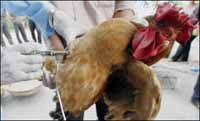Bird flu spreads to 4 more provinces in Vietnam
Bird flu has spread to another four Vietnamese provinces and could hit more areas because some farmers have failed to vaccinate their waterfowl, a senior government official said Tuesday.

About 2,000 ducks and geese in the northern provinces of Quang Ninh, Son La and Nam Dinh and the southern province of Can Tho have died of bird flu over the past week, and authorities slaughtered 4,000 other birds which may have been exposed, Vice Agriculture Minister Bui Ba Bong said.
All the birds that died or were slaughtered had not been vaccinated, he said.
Earlier this month, bird flu outbreaks were reported in the central province of Nghe An.
The government imposed a ban in 2005 on hatching and restocking waterfowl in a bid to prevent the spread of bird flu because waterfowl can carry the H5N1 virus without showing symptoms. However, the ban was largely ignored by many farmers, who continued raising waterfowl, and was lifted in March this year.
Bong defended the government's decision to lift the ban, saying it was not to blame for the latest cases.
"The government's lifting of the ban has nothing to do with the latest outbreaks," he said. "One of the main causes of the bird flu resurgence is farmers' failure to vaccinate their waterfowl."
Bong warned that the bird flu outbreaks could spread further.
"We expect more small-scale bird flu outbreaks, but nothing like the major, widespread outbreaks of 2003 and 2004," he said.
Bong said vaccinations, disinfecting the environment, and tight control over the transport of birds would be key to keeping the virus from spreading further.
Vietnam has vaccinated more than 115 million poultry so far this year, according to the Department of Animal Health.
Unvaccinated waterfowl were blamed in part for a bird flu outbreak among poultry that spread rapidly across eight southern Mekong Delta provinces in January, killing or forcing the slaughter of about 40,000 birds. It was the first outbreak to hit Vietnam in a year.
The H5N1 virus has killed at least 185 people worldwide, including 42 in Vietnam, since it began ravaging poultry stocks across Asia in late 2003, according to the World Health Organization. Vietnam's last human death was in November 2005.
It remains hard for people to catch, but experts worry that the virus may mutate into a form that passes easily among humans, potentially igniting a pandemic. So far, most human cases have been traced to contact with infected birds.
Subscribe to Pravda.Ru Telegram channel, Facebook, RSS!




